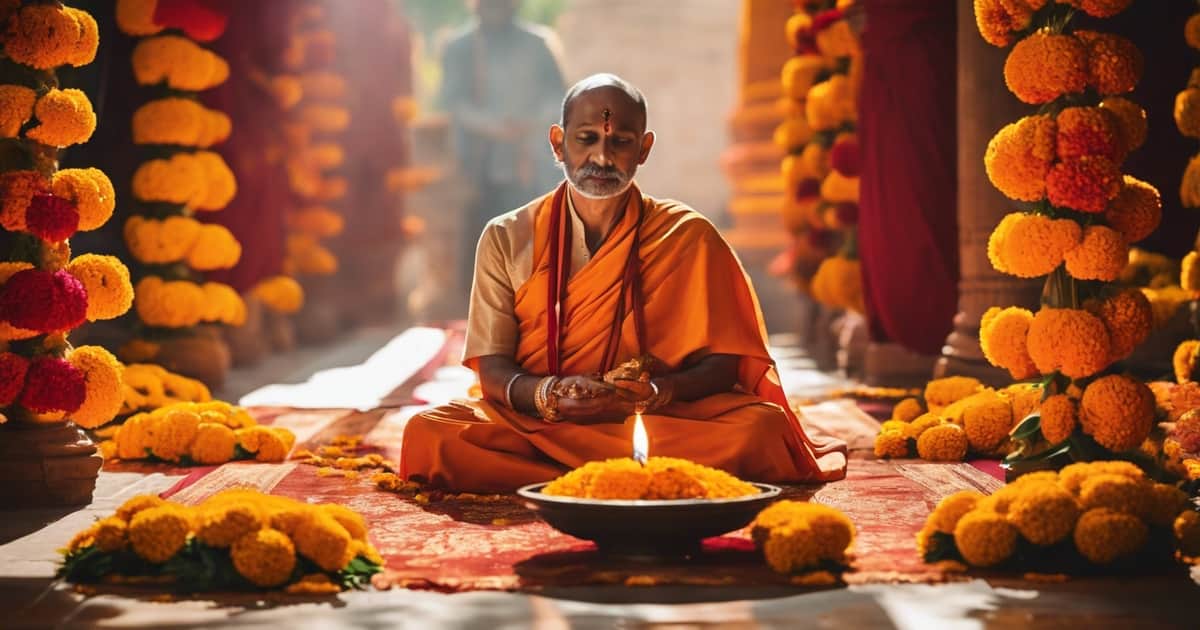Key Takeaway
Samskaras are psychological imprints accrued all through life that have an effect on conduct, ideas, and feelings. They’re a foundation for karma principle in Hindu philosophy and form a person’s persona. The origin of samskaras may be traced again to the Vedas of Hinduism, one of many world’s oldest spiritual texts.
Delving into the profound idea of saṃskara inside Hinduism, I’ll unravel how these pivotal components, rooted in historical Sanskrit texts and echoed in Vedic hymns, function the constructing blocks for ethical and religious improvement.
Saṃskaras in Hinduism should not merely rituals accompanied by Vedic hymns; they’re milestones like vidyarambha, the start of studying, or karnavedha, the ear-piercing ceremony, that contribute to shaping one’s id from start by way of maturity, as outlined within the Veda.
The phrase samskara originates from the Sanskrit phrases sam, that means full or joined collectively, and kara, that means motion, trigger, or doing.
The Significance of Samskaras in Hinduism
Samskaras are important for one’s religious journey in Hinduism. They intertwine with dharma and karma, influencing our life path, beliefs, perceptions, and even hidden expectations.
Non secular Progress Catalyst
Samskaras are rituals that mark progress on the religious path in Hinduism. They assist folks perceive their objective, and every ceremony of passage has deep that means.
Taking part in historical Sanskrit samskaras has at all times been a time of reflection and connection to yoga philosophy for me.
Dharma Connection
Responsibility, or dharma, is central to Hindu dwelling. Samskaras, rooted in Vedic Sanskrit traditions of Hinduism, reinforce this responsibility by setting expectations for demeanor and duty at every life stage by way of ritual practices.
Karma Penalties
Ignoring samskaras can have unfavourable results on karma.
It’s believed in Hinduism that skipping vital Sanskrit samskaras, as prescribed within the Veda, may end up in missed alternatives for karmic progress by way of ritual apply.

Overview of the Samskaras and Life Cycle Rites
Samskaras highlights vital moments from start to demise. These ceremonies embody ritual practices corresponding to marriage and symbolize the core samskaras of life’s passage.
Start to Childhood
The journey begins with the Garbhadhana, a Sanskrit ritual carried out inside Hinduism for conception, honoring outdated samskaras.
This baby-related Sanskrit ritual, Pumsavana, is carried out in Hinduism through the third month of being pregnant to make sure good well being for the mom and baby within the ceremony. Throughout the fifth month of being pregnant, the Hindu Sanskrit child ceremony, Simantonnayana, is noticed, the place prayers are supplied for a secure supply.
After start, Jatakarma welcomes the new child into the household. The Namakarana ceremony, rooted in Hinduism, bestows a Sanskrit title upon the newborn on the eleventh day. The primary feeding of stable meals, a ceremony often known as Annaprashana in Sanskrit, is widely known by way of a Hindu ritual.
Need to see a cute Annaprashan ceremony? Take a look at child Pransi’s!
Training Begins
At about 5 years outdated, kids bear Upanayana. It signifies their readiness to obtain schooling and data. This ceremony introduces them to their religious information or guru, marking a passage of their Hinduism journey, typically accompanied by Sanskrit chants.
Marriage Ceremony
Vivaha is likely one of the most vital samskaras. The ceremony marks the passage of two people right into a union, taking a vow for all times and honoring the ritual of partnership and life’s rites.
Later Life Rites
The Vanaprastha ceremony celebrates the passage from worldly duties to a concentrate on spirituality, typically coming after the rites related to having and elevating a child. The ritual of a kid’s passage from child to youth is a time for reflection and studying.
Renunciation Stage
Sannyasa is when one renounces materials life fully. It’s a dedication to reside solely for religious development. It’s the fruition of a human being’s need for freedom and alignment with the power of nature.
Samskara Transformative Potential
Samskaras impression how we predict and act.
We will change our samskaras consciously. By recognizing dangerous patterns, we will alter them for the higher, remodeling them right into a ritual of self-improvement, a ceremony of passage guided by enlightened texts.
I witnessed this transformative ceremony firsthand after I determined to interchange my procrastination behavior with the proactive planning ritual, marking a passage in my private improvement.
Samskaras as Sacraments: Uniting the Materials and Non secular
Samskaras act as connectors, linking our bodily world to a deeper spirituality. They mark life’s milestones and form people by way of rituals.
Past private spirituality, sanskaras keep societal order. They reinforce roles and tasks inside communities, making certain everybody is aware of their place and duties.
Recognizing and Reconciling Unfavorable Behavior Patterns
Samskaras affect how we predict and act. Figuring out and correcting unfavourable passages is essential for private development.
Determine Detrimental Samskaras
Each individual has patterns of conduct. Some can maintain us again. These are unfavourable samskaras, or behavior patterns, that we have to spot and navigate in ourselves as a passage to private development.
They typically work on a unconscious degree, shaping our actions and guiding our passage by way of life with out us realizing it.
Strategies for Rectification
As soon as we see these patterns, change can start. Self-awareness is step one in direction of rectifying them. This passage means listening to our each day habits and behaviors.
We should ask ourselves arduous questions concerning the passage of our actions and why we do what we do. Then, actively change unfavourable patterns with constructive ones. This passage might contain setting new objectives or discovering more healthy methods to deal with stress.
Steady Self-Enchancment
Hindu philosophy values self-improvement extremely.
Making small adjustments day by day results in vital enhancements over time. For instance, by merely beginning my day earlier, I’ve been capable of create a extra productive morning routine that units a constructive tone for the remainder of my actions.

Within the earlier part, we explored easy methods to determine unfavourable behavior patterns. Now, let’s concentrate on growing constructive samskaras to enhance our each day lives.
Optimistic Practices for Properly-Being
Optimistic samskaras are like seeds that develop into wholesome habits. By incorporating outdated samskaras like yoga into each day life, we nurture an area of stability and peace inside ourselves.
I discover that beginning my day with solar salutations not solely energizes my physique but in addition clears my thoughts, getting ready me to face the challenges forward with grace.
Rituals for Good Habits
Rituals present construction to our lives. They offer that means to our actions and remind us to keep up constructive habits and ideas all through the day. We internalize these rituals as a part of our id by constantly working towards them.
Enhanced Resolution-Making
After we adhere to sure samskaras, it helps us to enhance our decision-making skills. After we face decisions, working towards self-restraint by way of tapas can information us towards making choices which can be really helpful reasonably than deciding on one thing that could be interesting in the mean time.
Our concentrate on the parallel inside worlds of anatomy, psychology, and spirit, the place the roots of samskaras lie, is facilitated by vidya (consciousness or seeing clearly). This readability comes from inside power constructed by way of common adherence to constructive routines and thought patterns.
Samskaras Past Hinduism: Insights from Sikhism and Jainism
Samskaras form our ethical panorama. They affect how we predict, act, and reside.
Sikhism’s Samskara Perspective
Sikh teachings view samskaras otherwise than Hindu traditions. In Sikhism, the main target is on actions and intentions reasonably than rituals. The Guru Granth Sahib, Sikhism’s holy scripture, means that true samskaras are internalized by way of virtuous dwelling and devotion to God.

Shri Guru Granth Sahib, Vol. 1 of 4: Formatted For Academic Curiosity (Forgotten Books)
Jain Philosophy on Samskaras
Jainism interprets samskaras with an emphasis on non-violence (ahimsa) and detachment (aparigraha). Historic Sanskrit texts from the Jain custom spotlight the significance of purifying one’s soul to take away karmic bonds. This purification comes from moral dwelling and self-discipline.
Frequent Ethical Imprints
Regardless of their completely different approaches, these religions share widespread views on ethical imprints. All of them worth truthfulness, compassion, and self-control as key virtues shaping one’s life path.
Conclusion
Samskaras should not simply Hindu sacraments; they prolong into Sikhism and Jainism, providing common insights into private development and communal concord.
My journey by way of these sacred traditions underscores their potential to remodel unfavourable habits and information each day dwelling. I encourage you to delve deeper into your personal samskaras or life rituals, recognizing their energy to form id and objective.
Embrace these practices with mindfulness, and contemplate how they could enrich your path in direction of self-awareness and societal contribution.
Regularly Requested Questions
What’s an instance of a samskara?
A standard instance of a samskara is the ‘Upanayana’ ceremony, which marks the start of formal schooling for younger Hindu boys.
How do you break samskaras?
Breaking samskaras entails self-awareness, constant apply of mindfulness or meditation, and generally steering from a religious instructor to change deep-seated patterns.
What’s the distinction between karma and samskara?
Karma refers to actions and their penalties, whereas samskaras denote psychological impressions fashioned by previous experiences and recollections that have an effect on future responses and patterns.
What are the 16 sanskaras?
The 16 sanskaras are Hindu rites of passage that start with conception (Garbhadhana) and finish with funeral rites (Antyeshti), marking key life occasions.
What’s the that means of sanskara?
Sanskara means ‘impression’ or ‘ritual’ in Hindu philosophy, referring to psychological patterns from previous experiences or prescribed ceremonies marking life phases.

